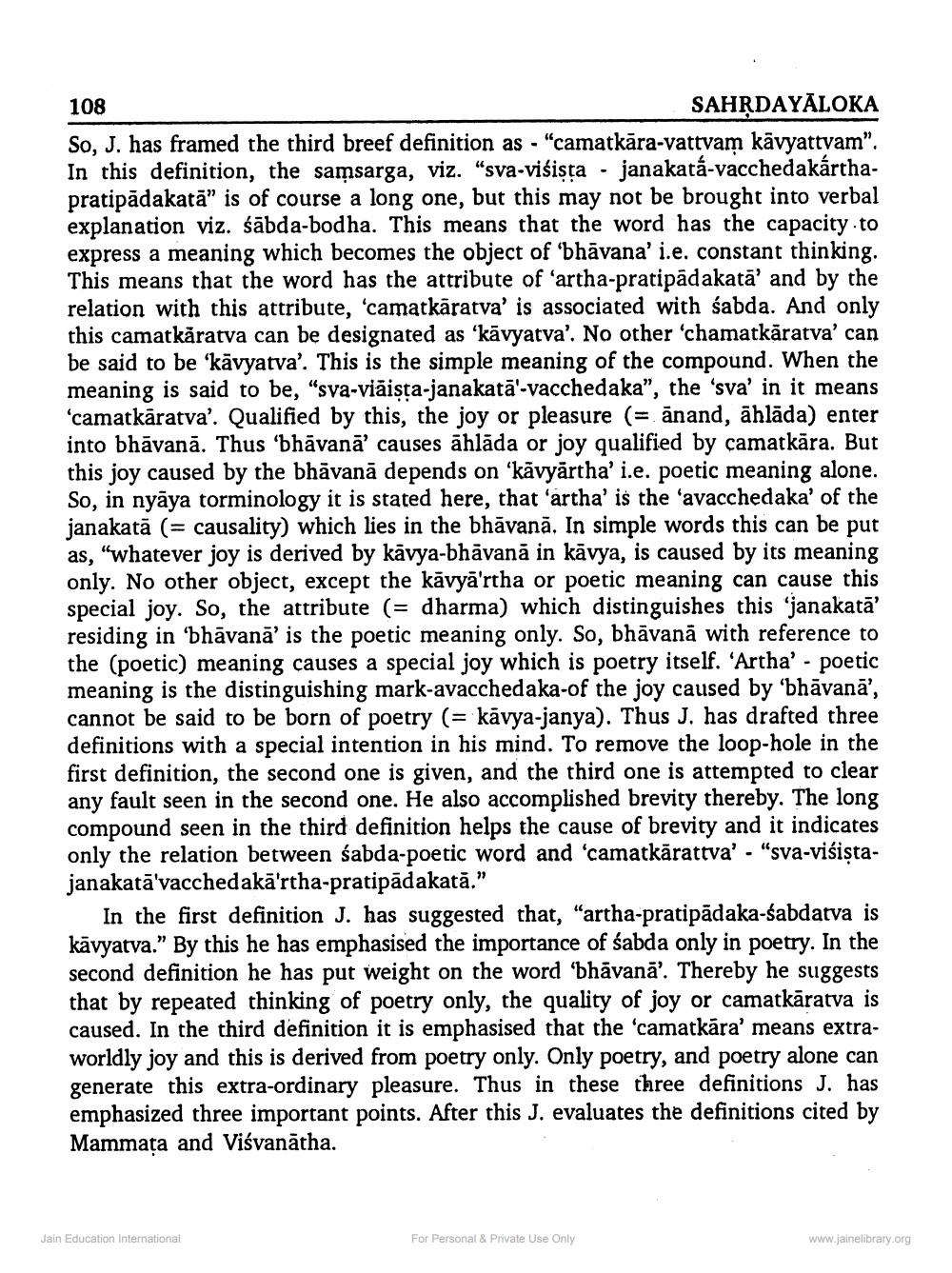________________
108
SAHRDAYĀLOKA So, J. has framed the third breef definition as - "camatkāra-vattvam kävyattvam". In this definition, the samsarga, viz. "sva-visista - janakata-vacchedakárthapratipădakatā” is of course a long one, but this may not be brought into verbal explanation viz. śābda-bodha. This means that the word has the capacity to express a meaning which becomes the object of 'bhāvana' i.e. constant thinking. This means that the word has the attribute of 'artha-pratipadakatā' and by the relation with this attribute, 'camatkāratva' is associated with sabda. And only this camatkåratva can be designated as 'kavyarva'. No other ‘chamatkāratva' can be said to be 'kävyatva'. This is the simple meaning of the compound. When the meaning is said to be, "sva-viãista-janakatā'-vacchedaka”, the 'sva' in it means 'camatkāratva'. Qualified by this, the joy or pleasure (= anand, āhlāda) enter into bhāvanā. Thus 'bhāvanā' causes āhlāda or joy qualified by camatkāra. But this joy caused by the bhāvanā depends on 'kávyārtha' i.e. poetic meaning alone. So, in nyāya torminology it is stated here, that ‘artha' is the 'avacchedaka' of the janakatā (= causality) which lies in the bhāvanā. In simple words this can be as, "whatever joy is derived by kävya-bhāvanā in kāvya, is caused by its meaning only. No other object, except the kāvyā'rtha or poetic meaning can cause this special joy. So, the attribute (= dharma) which distinguishes this "janakata' residing in 'bhāvanā' is the poetic meaning only. So, bhāvanā with reference to the (poetic) meaning causes a special joy which is poetry itself. 'Artha' - poetic meaning is the distinguishing mark-avacchedaka-of the joy caused by 'bhāvanā', cannot be said to be born of poetry (= kāvya-janya). Thus J. has drafted three definitions with a special intention in his mind. To remove the loop-hole in the first definition, the second one is given, and the third one is attempted to clear any fault seen in the second one. He also accomplished brevity thereby. The long compound seen in the third definition helps the cause of brevity and it indicates only the relation between sabda-poetic word and 'camatkārattva' - "sva-visistajanakatā'vacchedakā'rtha-pratipadakată.”
In the first definition J. has suggested that, "artha-pratipadaka-sabdatva is kāvyatva." By this he has emphasised the importance of śabda only in poetry. In the second definition he has put weight on the word 'bhāvanā'. Thereby he suggests that by repeated thinking of poetry only, the quality of joy or camatkāratva is caused. In the third definition it is emphasised that the 'camatkāra' means extra worldly joy and this is derived from poetry only. Only poetry, and poetry alone can generate this extra-ordinary pleasure. Thus in these three definitions J. has emphasized three important points. After this J. evaluates the definitions cited by Mammata and Viśvanātha.
Jain Education International
For Personal & Private Use Only
www.jainelibrary.org




